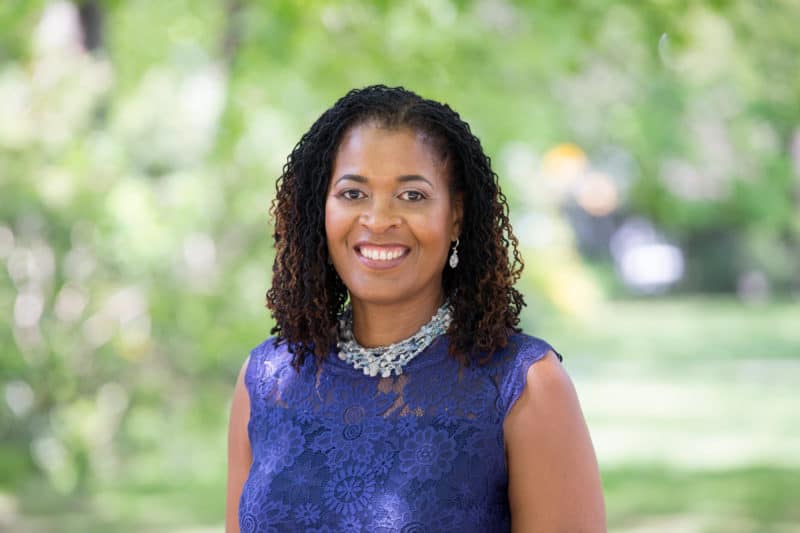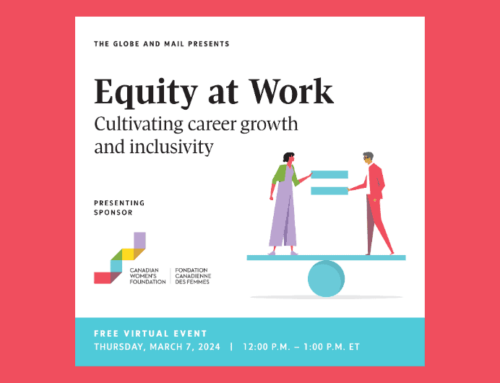This blog post was originally published on The Ace Class.
With the rise of the #MeToo and Time’s Up movements, as well as the global women’s marches taking place all over the world, the spotlight on women’s rights and gender equality has taken front stage. However, even in Canada, we still have a long way to go to achieve equality for all women – not just for some.
One woman who has devoted her career to advancing, empowering and supporting women and girls is Paulette Senior. Immigrating to Canada from Jamaica when she was a young girl, Paulette grew up surrounded by a strong collective of family and friends in a matriarchal family. As a result, she witnessed first-hand the power of female leaders, and how natural it was to have women lead. But after personally experiencing the effects of disempowering relationships, she knew she wanted to dedicate her life work to empowering women and girls to reach their full potential.
Now working as the President and CEO for the Canadian Women’s Foundation, after 10 years as CEO of YWCA Canada, Paulette is leading an inclusive, national movement towards equity that not only empowers women, but strengthens all Canadians. Paulette fully exemplifies what it means to be a woman that empowers other women, using her position of authority and influence to lift all women around her up and allow them to find their confidence and use their voice.
We had the chance to speak with Paulette on how she believes gender equality will be achieved, how she stays motivated and inspired in her work, and how she believes women will truly rise up.
When you were a young girl, you immigrated to Canada from Jamaica. Tell us about your experiences growing up in Jamaica and your experience immigrating to Canada?
I had a strong sense of community growing up in Jamaica. I really had that feeling of it being like a village – a lot of people looked out for me.
I excelled at school and I skipped grades, and I felt I had all that I needed. Even after my parents and siblings immigrated to Canada before me, I remember my parents sending me things back home – I even remember my grandmother sending cutouts of my foot size to my parents so that they’d know what size shoes to send me! I felt I had all that I needed – I felt privileged.
But I was also the last one to come to Canada, and I experienced a lot of loneliness. I don’t think that’s an uncommon experience for someone immigrating to a country. For a while I felt like an outsider. But for me, that feeling of being ‘outside’ was more about the experience of immigrating to Canada. Being the last member of my family to arrive in Canada, I also had the benefit of spending the most time with my grandmother in Jamaica, which had a strong impact on me.
What inspired you to do work that empowers women and girls, and why?
I grew up in a tight-knit community and a matriarchal family, where women naturally led.
I know what it is like to be in a disempowering relationship, and I know what it is like to have to re-empower myself. I have had to reignite my passion and purpose. That was something I had to go through, and it led me to the kind of work that I do today.
When I see a woman or girl who may be lacking a sense of purpose and confidence, I see potential. When I can support a mother or a woman to find that for herself, I know she will have the strength to make a difference in her own community.
Given the long, hard battle towards women’s equality that is still persisting, what keeps you motivated? Do you ever get discouraged?
What keeps me motivated is the possibility for change. I love meeting people who share a vision for what is possible. I have a vision, and I’m not unique in that vision – we know that society doesn’t change by itself. It changes because we have a vision that we work on collectively.
I do get discouraged sometimes, particularly when I see people in positions of power and privilege who fight against that vision. They have the power to change the trajectory. Do people in those positions have others in mind for their vision, or do they exclude others? Do they want to make things work for all of us, or just some of us?
But I am re-inspired in that change is possible. That discouragement makes us realize we’re fighting for something. Those of us who work in the women’s sector believe that change is possible, and we believe justice and equality can be a reality.
Women’s equality will come with both small steps and large steps. What do you think are the crucial first steps (both big and small) that need to be made in Canada?
We have a saying at the Canadian Women’s Foundation: ‘Until all of us have made it, none of us have made it.’ It’s from Rosemary Brown, one of our Foundation’s founding mothers and the first African-Canadian woman elected to a provincial legislature.
On top of gender discrimination, some women face barriers related to race, economic status, abilities or disabilities, location, sexual orientation, age, culture, and language. For example, visible minority women are more likely to experience sexual harassment, 60% of disabled women experience some form of violence, and 37% of First Nations women living off reserve are living in poverty.
The most pressing next step is to shine a light on those who are most marginalized: The women and girls who face the most barriers when it comes to speaking out about sexual violence. We do this every day through the pillars of our work, by lifting women out of poverty and violence, and into confidence and leadership. Making sure that women are free from violence, and are in financially sustainable, supportive situations, is a foundational step we can take to begin to address the barriers faced by the most vulnerable.
We can make progress on this front through financial support, and by making sure that when we talk about sexual violence, we talk about how it affects the most marginalized. The #MeToo movement cannot exclude Indigenous women, women of colour, trans women, and disabled women like other movements have in the past.
Ace stands for Activating, Cultivating, and Empowering women. What do you think are the best strategies to go about doing that? How do you see women rise up?
I really believe in the power of connecting with people from diverse viewpoints – of having an exchange of ideas, of fostering shared goals, of making commitments to work toward gender equity in our own spheres.
We may sometimes feel disempowered, but thankfully we all have our own spheres of influence that we can reach in a unique and genuine way that other people can’t. I see women rise up when they realize how they can impact their communities positively. When they realize that they do, indeed, have influence in the places they live, work, and play. When they realize they are not powerless. That is what this past year or two has been about with the #MeToo movement as just one example. This is only the beginning.
And you don’t have to be working in the women’s sector or the nonprofit world to make that kind of impact. It comes down to small, consistent efforts where you live, work, and play to create the kind of world that is fair and equitable. It also comes down to being brave enough to call things out when they aren’t just.
Over the past year, interest in gender equity has been elevated beyond what most of us in the sector have ever experienced. Coffee shops, kitchen tables, and watercoolers have played host to countless conversations about women’s rights, sexual harassment, gender-based violence, equity and inclusion. I’m really interested in harnessing that wave. The people having these conversations have the potential to be real changemakers in their spheres of influence. The problem is, many people don’t know what to do. While they want to do something – while they feel they MUST do something – they’re unsure what that something could be. That’s where the Canadian Women’s Foundation comes in. We move women and girls out of violence, out of poverty, and into confidence and leadership. And our biggest fundraiser of the year, The Exchange, is coming to Calgary on October 25, 2018 with the incredible Denise Donlon. This is one way that Calgarians can get concretely and directly involved in a dialogue on gender equity while helping to fund programs in your community and throughout Canada.
What advice do you have for women who want to get involved in work that empowers women and girls, but don’t know where to start?
Start with what you’re seeing around you. What’s missing? Who’s missing? Are you working in corporate Canada? Are you in healthcare? You don’t have to start over. You can engage people wherever you are. Talk with colleagues – share ideas and challenges.
Also seek out conversations with individuals who are at the place where you’d like to be and get their advice.
What will be the biggest challenge for the generation of women behind you?
According to a survey we did in 2017, four in five Canadians believe the next generation of women are just as likely to experience sexual assault. They’re also concerned the next generation will be just as likely to experience other forms of violence too, like online harassment, physical violence from a partner, emotional abuse, and workplace harassment.
Additionally, our most recent survey shows that Canadians’ understanding of consent has actually decreased over the last three years. Only 28% of Canadians fully understand what it means to give consent, compared with 33% in 2015. The survey also shows that 50% of women in Canada have felt pressured to consent to unwanted sexual activity. Despite the powerful conversations about sexual assault and harassment that #MeToo has sparked, confusion about what constitutes consent remains.
One of the challenges the next generation will face will be to increase understanding of consent, and ensure that positive, ongoing consent is always being practiced. The next generation deserves full freedom from sexual violence, and consent education is an important part of that future.
What keeps you growing as a leader?
I never think I know it all. I have an open mind to learning. In a more formal way, I engage an executive coach for feedback on areas that I still question and that I want to excel in. I surround myself with folks who have my back but also will reflect reality to me. I also make sure I’m not ‘standing on a podium’ so to speak. I stand with people – people who are also on a journey and want to get somewhere, and I’m on that learning journey too.
What does equality mean to you?
Equality is when no one is left out, whether by measurement or sense of belonging. It’s where you have equal access to resources, opportunities, education, promotion, and achievement. It’s barrier-free, and it’s without discrimination.
Learn More:
- 5 Ways Gender Equality Benefits Everyone
- No, Moms, the gender pay gap is not on us
- Why I’ve Spent my Life Dedicated to Women and Girls – and Why You Should do the Same
Take Action:
- Sign up for our e-newsletter to have our latest stories and resources sent to your inbox.
- Follow us on Facebook and Twitter to join a national conversation about empowering girls.







